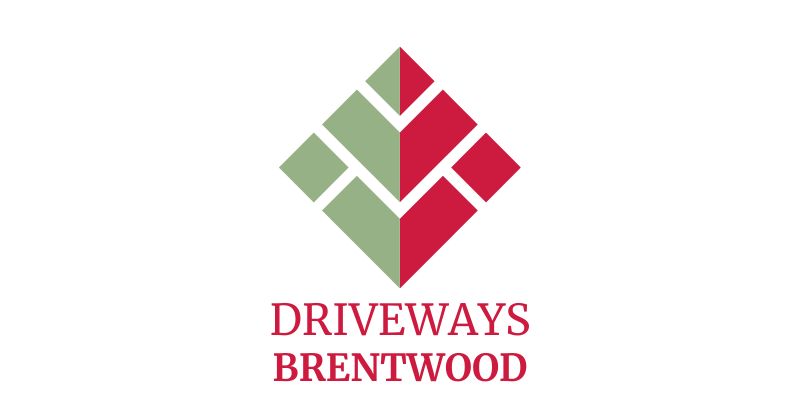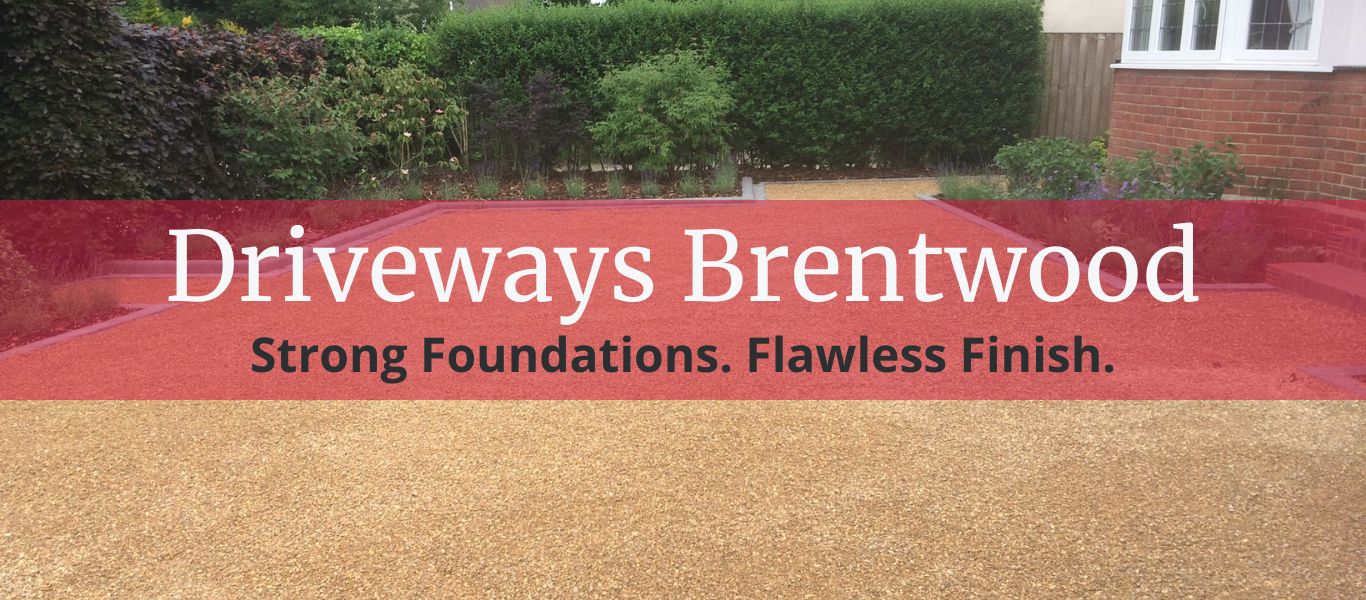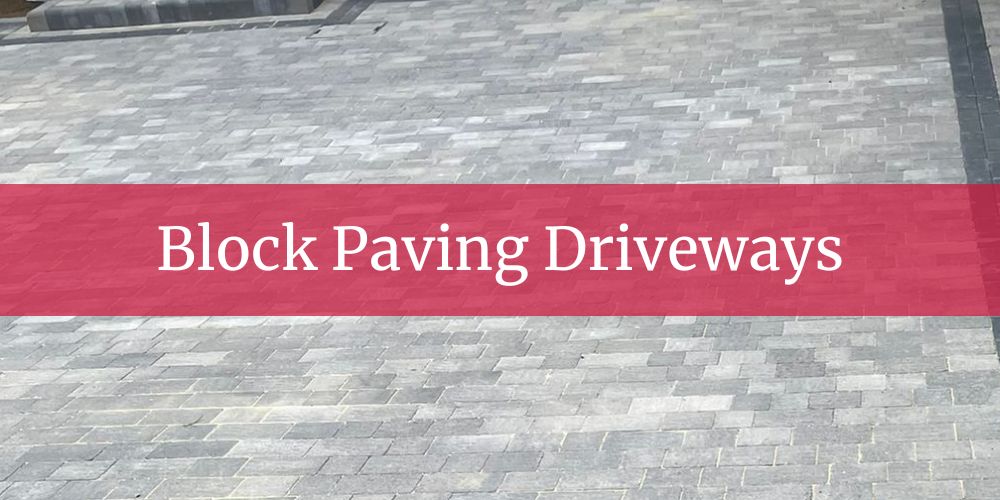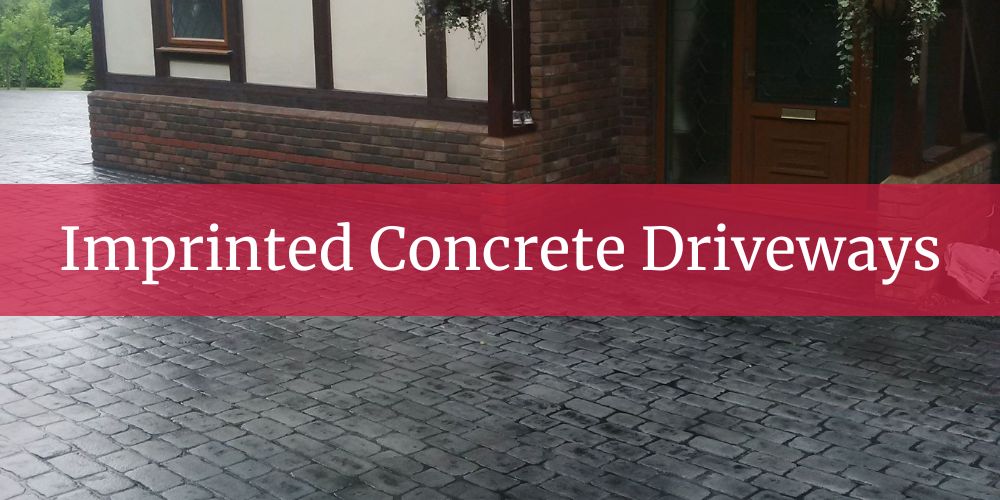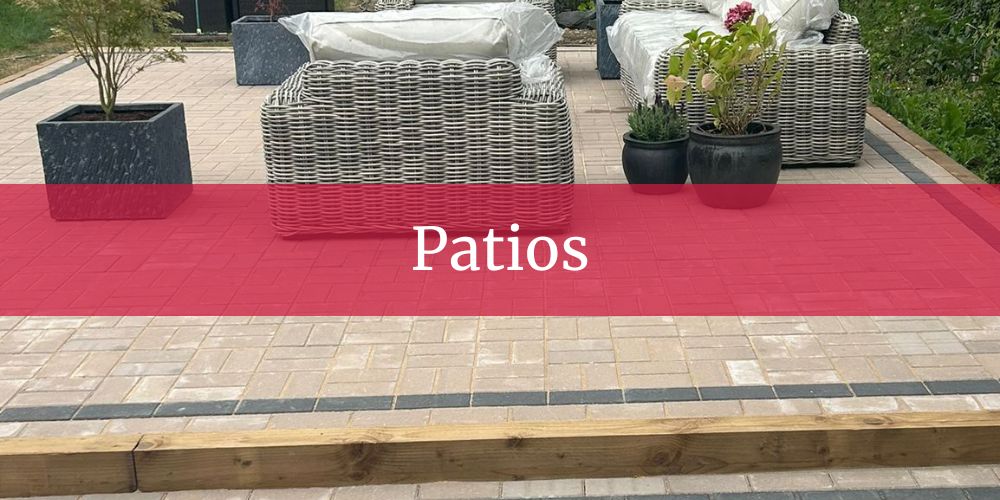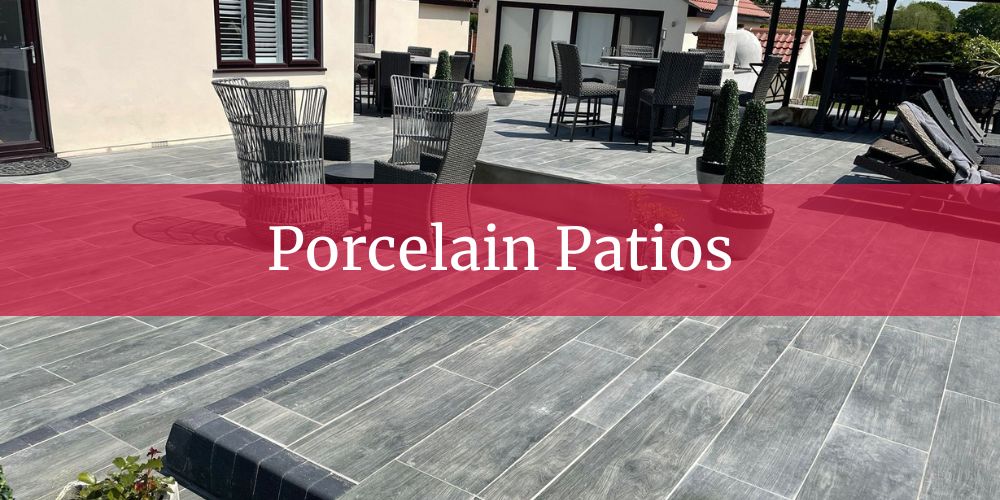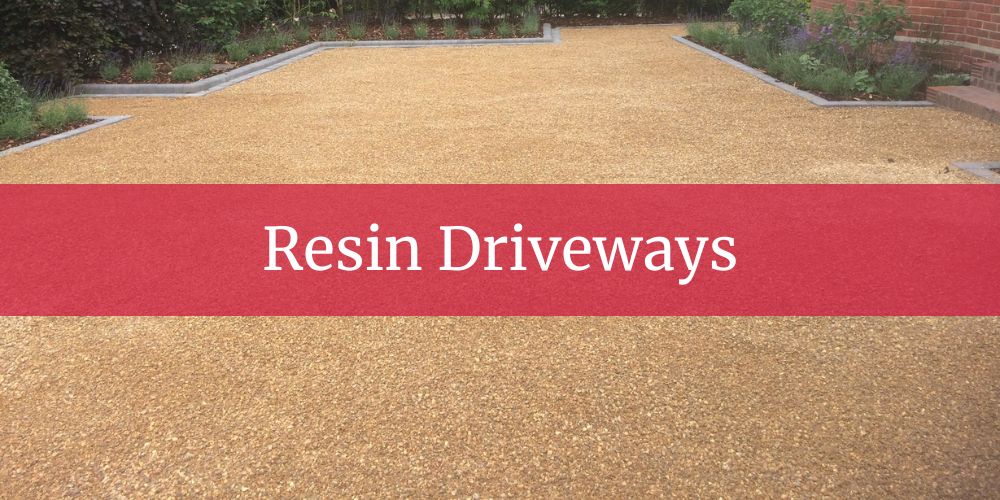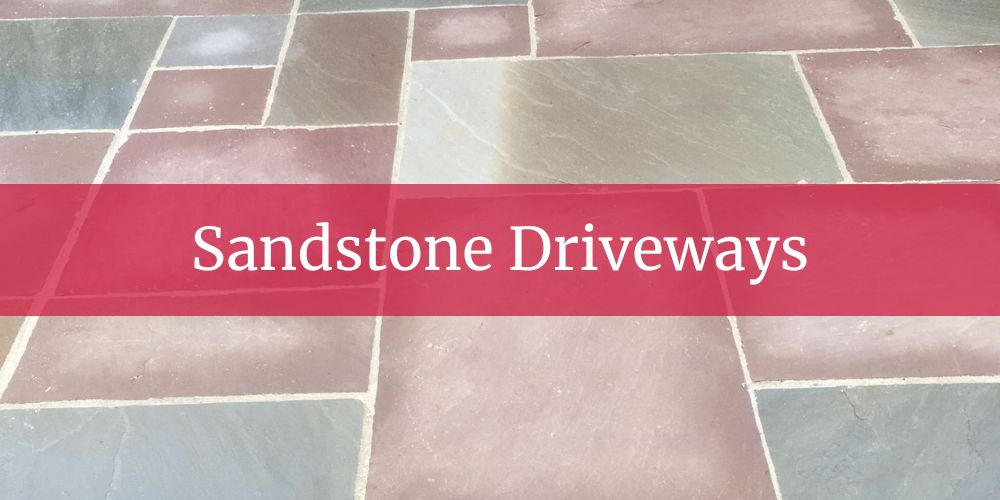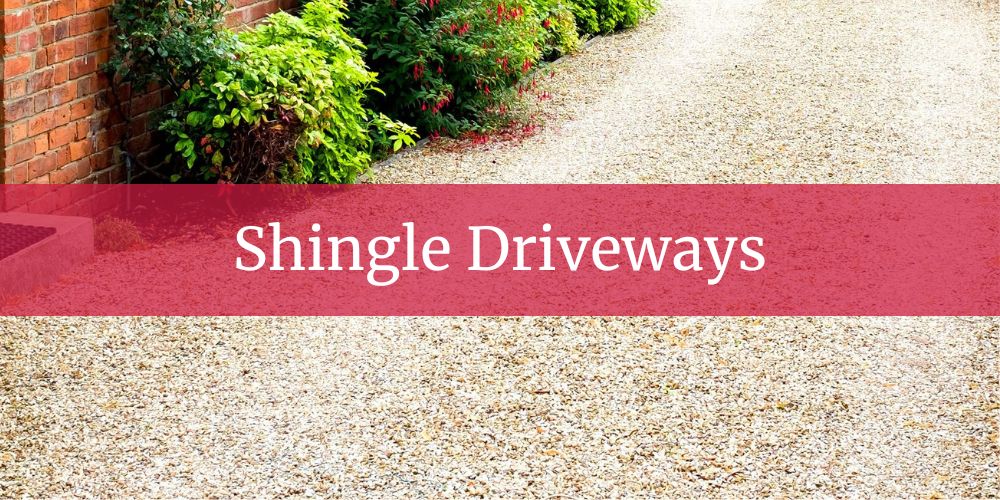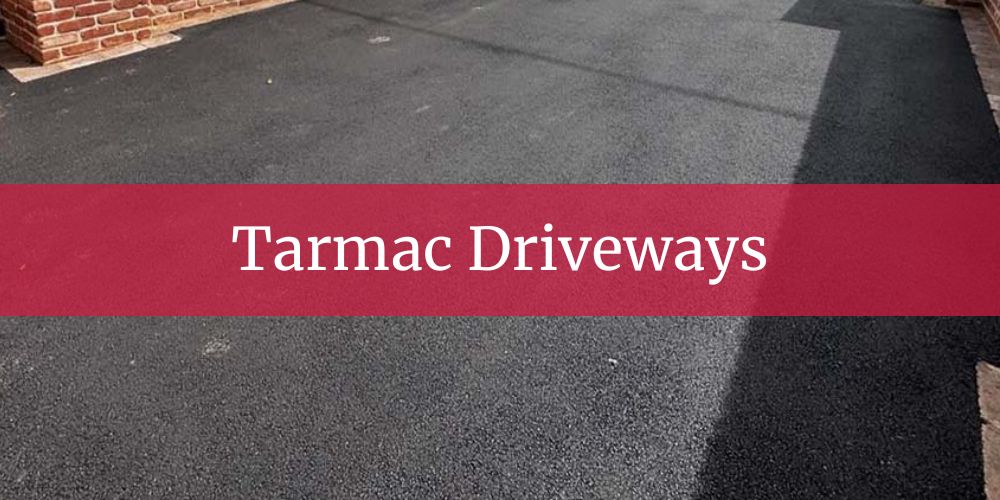Driveways Brentwood: Resin, Imprinted Concrete and Block Paving Specialists
Driveways Brentwood are specialist installers of resin-bound and pattern-imprinted concrete driveways across Brentwood, Shenfield, Hutton, Warley, Ingatestone and nearby villages. These are our focus systems: resin for a seamless, SuDS-friendly finish with UV-stable binders; imprinted concrete for a monolithic, weed-free slab with realistic stone, slate or brick effects and anti-slip sealing where needed. Every project is engineered for long life on Brentwood’s clay-rich ground—properly compacted MOT Type 1 (or Type 3 for permeable) foundations, accurate levels and falls, discreet threshold channels and soakaways, plus permeable build-ups where appropriate. From first survey to final sweep-up, we handle everything: design, groundworks, edging, drainage, finishing details and a clean handover.
If resin-bound or imprinted concrete isn’t your choice, we also have specialists in block paving, sandstone, shingle and tarmac driveways. All our driveways sit on the correct sub-base with robust edging and planned drainage. Expect neat thresholds, crisp margins, and a finish that stands up to daily parking and year-round weather. We work cleanly, keep you informed throughout the installation, and leave your property ready to enjoy.
Why Choose Driveways Brentwood as Your Brentwood Driveway Contractor?
Choose Driveways Brentwood if you want specialists in the two systems that perform brilliantly on Brentwood’s clay-rich ground and busy commuter plots: resin-bound (UV-stable, SuDS-ready) and pattern-imprinted concrete (monolithic, weed-free, anti-slip sealed where required). We engineer every driveway for local conditions—properly compacted MOT Type 1 bases (or Type 3 for permeable designs), laser-set falls, discreet threshold channels and soakaways sized to the site, plus corrosion-resistant grilles and robust edge restraints. Our finishing is meticulous: crisp edging, tidy thresholds, hidden recessed covers, and joint layouts planned to manage shrinkage and vehicle load paths without spoiling the pattern. You’ll get clear timelines, consistent communication, and a considerate team that keeps the site neat, protects access, and cleans down daily. We use market-leading binders, aggregates and concretes, installed by a local team that knows the geology and rainfall patterns from Shenfield and Hutton to Ingatestone and Warley. Designs are SuDS-compliant where suitable; otherwise we integrate soakaways and discreet drainage to keep façades dry. Every driveway is handed over with maintenance guidance and a written guarantee—built to look great and last in Brentwood.
- Specialist Finishes: resin-bound (UV-stable, SuDS-capable) and imprinted concrete (monolithic, low-joint).
- Built for Brentwood: compacted MOT Type 1/Type 3, precise falls, threshold channels sized to clay soils.
- Durable detailing: corrosion-resistant grilles/trims, strong kerbs and steel/granite edge restraints.
- Premium finish: crisp lines, aligned patterns, recessed covers that disappear into the design.
- Reliable delivery: clear schedule, respectful local team, daily clean-downs.
- Proven materials: market-leading binders, aggregates, concrete and paving systems.
- Smart drainage: SuDS where viable; otherwise channels and soakaways designed for the plot.
- Aftercare: practical maintenance guidance, written guarantee and ongoing support.
1. Specialist Finishes: resin-bound (UV-stable, SuDS-capable) and imprinted concrete (monolithic, low-joint)
Driveways Brentwood focuses on the two systems that consistently deliver performance and polish for local homes, and we specify them to a high technical standard. Resin-bound uses UV-stable aliphatic binders with calibrated 1–5 mm aggregates to create a smooth, porous surface that supports SuDS, sheds water effectively and resists colour fade. We design the build either as an overlay to sound asphalt/concrete or as a full system on a new base, paying attention to edge restraint, trowel finish, slip resistance and curing conditions so the surface remains even and accessible, including for wheelchairs and pushchairs. Pattern-imprinted concrete forms a single, reinforced slab with realistic stone, slate or brick effects; we specify base depth to suit vehicle loads, control joint layout to manage shrinkage, apply colour hardeners and release agents for depth of tone, and finish with sealers (with optional anti-slip additive) for stain and UV resistance. At survey we’ll assess traffic loads, shade, tree proximity and drainage routes, then help you choose the system and build-up that best fits your property and the way you use it.
2. Built for Brentwood: compacted MOT Type 1/Type 3, precise falls, threshold channels sized to clay soils
Brentwood’s London Clay shrinks and swells with seasons, so excavation, profiling and compaction must be controlled. We install MOT Type 1 for conventional build-ups and Type 3 for permeable designs, compacted in thin, measured layers to achieve reliable bearing capacity; where ground is variable or made-up, we add separation geotextiles to limit fines migration. Falls are set with a rotary/laser level and checked against door thresholds and pavement tie-ins, typically achieving positive gradients that move water away from façades without creating uncomfortable ramps. Threshold channels are sized to the catchment (drive length, roof contributions and crossfall), with silt traps for maintenance and options to connect to soakaways where infiltration is viable. For heavier vehicles, steep plots or tree-affected ground we’ll verify sub-base depth and, if appropriate, recommend CBR checks or permeable alternatives—so you get a driveway engineered for local conditions, not a one-size-fits-all build.
3. Durable detailing: corrosion-resistant grilles/trims, strong kerbs and steel/granite edge restraints
Longevity is decided at the edges and interfaces, so we detail these deliberately. Corrosion-resistant grilles and trims handle winter road salts and routine jet-washing, while robust kerb selections protect borders and keep lines crisp under tyre scrub. On resin-bound and tarmac builds, steel or granite edge restraints are pinned at tight centres around curves and transitions to prevent lateral creep and preserve the profile; for block paving, soldier courses and haunched kerbs lock the pavement and resist rucking at turns. Recessed covers are set flush and in-pattern, upstands are sealed where needed, and joint locations are planned around services and load paths to avoid weak spots. This attention to detail keeps the surface locked, tidy and easier to maintain over time.
4. Premium finish: crisp lines, aligned patterns, recessed covers that disappear into the design
A premium driveway is as much about precision as it is about materials, so we treat finishing as a craft. Cuts are planned to avoid thin slivers, joint widths are kept consistent, and pattern modules are aligned to doorways, steps and boundaries so borders read as intentional design rather than off-cuts. Recessed manhole covers are aligned to the laying pattern and colour-matched to reduce visual interruption, improving both appearance and safety. Tie-ins to public pavements, garage thresholds and garden paths are resolved cleanly, with careful transitions in colour and texture to avoid trip points and staining. Before handover, we complete a meticulous clean-down and, where specified, sealing—so from the kerb the driveway looks sharp and, up close, the workmanship stands up to scrutiny.
5. Reliable delivery: clear schedule, respectful local team, daily clean-downs
From day one you’ll receive a written programme that sets out start dates, key milestones (excavation, sub-base, edging, surface installation, sealing), access arrangements and any dependencies such as dropped-kerb timing. Before we break ground, your project lead holds a brief pre-start meeting to confirm bin/vehicle access, material delivery routes, working hours and neighbour considerations, and remains your single point of contact throughout. On site we stage materials to minimise disruption, use dust and slurry control when cutting, protect lawns and paving with boards, and maintain safe pedestrian routes at all times. Each afternoon we complete a tidy-down—sweeping, stacking, and fencing where required—so the property remains usable and the street stays presentable. Progress updates are proactive, weather contingencies are communicated early, and any variations are agreed in writing. Handover includes a joint inspection, snag resolution, photographs for your records and confirmation that the build matches the agreed specification.
6. Proven materials: market-leading binders, aggregates, concrete and paving systems
We specify systems with proven UK performance and traceable supply chains. Resin-bound installations use aliphatic, UV-stable binders paired with calibrated blends (typically 1–3 mm and 2–5 mm) to achieve consistent porosity, texture and colour fastness; primers and base coats are matched to the substrate to maximise bond. Concrete slabs are designed for loading and finish quality, using mixes and additives compatible with colour hardeners and release agents, with curing windows respected to avoid surface chalking or craze cracking. Block paving, kerbs and setts meet relevant standards for dimensional tolerance and abrasion resistance, ensuring tight, repeatable joints and long service life. For porcelain, we use proprietary primers to bond low-porosity tiles, fully supported rigid bedding to avoid voids, and high-performance grouts that resist staining and freeze–thaw. Sealers and coatings are selected for breathability, UV stability and oil resistance, so aesthetics hold up under vehicle traffic and year-round weather.
7. Smart drainage: SuDS where viable; otherwise channels and soakaways designed for the plot
Drainage starts at design, not after the fact. Where infiltration is feasible, we deliver SuDS-compliant build-ups using permeable surfaces over free-draining Type 3 sub-bases so rainfall percolates safely without overloading gullies. If the ground or site constraints make infiltration unsuitable, we form positive drainage with laser-set falls into linear threshold channels fitted with silt traps, then size soakaways or connect to approved outfalls as permitted. Catchment is calculated from driveway area, gradient and any contributing roof surfaces, ensuring channels aren’t overwhelmed in heavy downpours. Details such as recessed covers, upstand sealing at thresholds and drip details at façades prevent splashback and staining. We also advise on planning thresholds—like when impermeable areas over 5 m² at the front of a property could require permission—so your driveway performs reliably and remains compliant.
8. Aftercare: practical maintenance guidance, written guarantee and ongoing support
At completion you’ll receive tailored care notes that match your chosen surface and site conditions. Resin-bound surfaces benefit from gentle jet-washing with a fan lance, prompt treatment of oil or leaf tannin marks, and avoidance of sharp-edged shovels; typical cure times are outlined so you know when foot and vehicle traffic can resume. Block paving retains its interlock with periodic sweeping and kiln-dried re-sanding, with optional sealing where you want extra stain resistance. Pattern-imprinted concrete keeps its depth of colour when resealed on an appropriate cycle; we’ll advise intervals based on sun exposure and traffic, and include guidance on anti-slip additives where needed. Fresh tarmac appreciates sensible early-life care—no tight steering while stationary, careful turning of heavy vehicles, and quick clean-up of fuel spills—after which it settles into low-maintenance service. For porcelain, routine neutral cleaning, intact movement joints and good drainage keep edges sharp and surfaces grippy. Your installation is documented with a written workmanship guarantee, and we remain available for check-ups, reseals and future additions so the driveway continues to look sharp and work hard for years.
Have a question about an upcoming project?
What Is A Driveway Contractor?
A driveway contractor is a specialist who takes your frontage from concept to completion: they survey the plot, set the geometry and levels, engineer the sub-base, install edging and drainage, and lay the chosen surface—whether that’s resin-bound, pattern-imprinted concrete, block paving or tarmac. They also handle the practical details that make a driveway last, such as damp-proof course clearances, threshold transitions, recessed service covers that sit flush and in-pattern, and safe tie-ins to pavements and garage floors. Coordination with utilities is part of the job, as is responsible spoil removal and a clean, safe site throughout the build. When the work is done, a good contractor explains maintenance so the finish stays sharp and serviceable year after year.
In Brentwood, the role goes further because local ground and planning realities matter. London Clay shrinks and swells with the seasons, so excavation and layered compaction are controlled, typically with MOT Type 1 (or Type 3 where a permeable design is specified) over separation geotextiles to prevent fines migration. Levels are set with laser accuracy to move water away from façades, and threshold channels are sized to the driveway’s catchment—important on Shenfield and Hutton commuter plots where daily vehicle turning can stress edges. Where SuDS is viable we design permeable build-ups; otherwise we integrate soakaways and discreet channels to keep façades dry and paths slip-free. Detailing—granite or steel edge restraints, corrosion-resistant grilles, neat tie-ins to public footways—keeps lines crisp and the surface locked under turning loads.
Compliance and permissions are part of a Brentwood contractor’s remit too. We’ll advise when front gardens over 5 m² of impermeable surfacing may need planning consent via Brentwood Borough Council, and guide you through dropped-kerb (vehicle crossover) approvals with Essex County Council Highways. Conservation sensitivities in places like South Weald or Ingatestone, plus tree protection orders, influence material choices and root-safe construction; your contractor navigates these so the driveway looks right, performs well and meets the rules.
If you’re in Brentwood, Shenfield, Hutton, Warley, Ingatestone and nearby villages, Driveways Brentwood delivers this complete contractor service—survey, design, groundworks, drainage and surface installation—tailored to local clay soils and streetscapes. Tell us how you want to use your driveway and how you want it to look. Then, Driveways Brentwood will engineer a driveway that fits your home and Brentwood’s conditions perfectly.
Where Do Driveways Brentwood Provide Driveway Services?
Driveways Brentwood covers the whole Brentwood Borough and surrounding towns and villages. Core areas include Brentwood, Shenfield, Hutton, Pilgrims Hatch, Warley, Great Warley, Little Warley, Ingrave, Herongate, South Weald, West Horndon, and Navestock. We also serve Ingatestone, Fryerning, Mountnessing, Doddinghurst, Blackmore, Kelvedon Hatch, Stondon Massey, Hook End, and Wyatts Green. We also serve areas just outside Brentwood, this includes; Billericay, Stock, and Ramsden Heath—if you’re nearby, just ask and we’ll confirm coverage.
What Types Of Driveways Do Driveways Brentwood Install?
Driveways Brentwood specialises in resin-bound and pattern-imprinted concrete driveways—our core systems for a seamless, durable finish engineered for Brentwood’s London Clay (SuDS-ready resin build-ups and drainage-planned imprinted slabs with optional anti-slip). We also install block paving and tarmac where a modular or fast-lay surface is preferred. For natural character and budget flexibility, we offer sandstone and shingle (gravel) driveways. Every project includes survey, design, groundworks, edging, levels and drainage detailing—finished with neat thresholds and tidy workmanship across Brentwood, Shenfield, Hutton, Warley, Ingatestone and nearby villages.
- Resin Driveways: Seamless, UV-stable, SuDS-capable where viable.
- Imprinted Concrete Driveways: Monolithic, weed-free, realistic stone/slate/cobble looks.
- Block Paving Driveways: Modular, repairable, custom colours/borders; permeable options.
- Tarmac Driveways: Fast, cost-effective; SMA/heavy-duty specs for turning loads.
- Sandstone Driveways: Natural flags/setts; classic kerb appeal with rigid build-ups.
- Shingle (Gravel) Driveways: Free-draining, SuDS-friendly; optional stabilisation grids.
1. Resin Driveways
Resin-bound surfacing creates a seamless, no-loose-stone finish that is comfortable underfoot and quiet under tyres. We specify UV-stable aliphatic binders with washed, kiln-dried aggregates, typically 2 to 5 mm, to achieve colour stability and strong mechanical interlock under frequent turning on Brentwood plots. Depending on the site, the system can be laid as a fully permeable build up with Type 3 sub-base and a porous base to support SuDS, or as a positively drained build where London Clay limits infiltration, with falls set at approximately 1:60 to 1:80 to threshold or linear channels and a soakaway sized to BRE guidance. Typical wearing depth is around 18 to 20 mm and edges are contained with granite setts, aluminium or steel trims so margins stay crisp and thresholds are protected. We control temperature and humidity during mixing and laying, back-roll for an even texture, and can broadcast a fine anti-slip along primary walk routes and slopes for confident wet footing without changing the appearance. Where the existing asphalt or concrete is sound, we can overlay after repairs and priming, otherwise we construct a new base with separation geotextile on clay to prevent fines migration and to maintain long term stability.
2. Imprinted Concrete Driveways
Pattern-imprinted concrete is a single, reinforced slab that delivers realistic stone, slate, cobble or brick effects with very few joints and excellent load capacity. We excavate and place a compacted granular sub-base, then pour a slab typically 100 to 125 mm thick, using welded mesh or macro-fibres according to duty, and set laser-checked falls to move water away from façades into threshold channels with silt traps. Control joints are saw-cut within 24 to 48 hours to about one quarter of the slab depth and aligned to faux grout lines or border bands so shrinkage is controlled without spoiling the pattern, and expansion joints are formed at abutments such as garage slabs or walls. Colour is achieved with integral pigment or dry-shake hardener and antique release for depth and variation, followed by a UV-stable sealer in matte or satin, with optional anti-slip additive for the main walk path. Preparation and curing are managed closely, including protection from rain and cold, so the stamp window is correct and the surface cures evenly, and ongoing care is straightforward with periodic washing and resealing every 3 to 5 years to keep colour rich and the surface protected.
3. Block Paving Driveways
Interlocking block pavements perform well for daily parking and tight turning, and they offer flexible design with colours, borders and bands that complement Brentwood homes. A typical build uses 150 to 200 mm of compacted MOT Type 1 over a separation geotextile on clay, a 30 to 40 mm sharp-sand screed that is levelled and protected from traffic, and 50 to 60 mm blocks laid to line and level, then compacted with a plate compactor and a protective mat near edges. Herringbone at 45 or 90 degrees gives the best interlock at steering points, joints are filled with kiln-dried sand and re-sanded after initial settlement, and edge restraints are haunched kerbs or granite setts to prevent lateral movement. Where infiltration is viable, permeable systems use Type 3 sub-base with open-graded bedding and joint aggregates so rainfall can drain through the surface, with inspection points for maintenance and vacuum extraction recommended periodically to restore porosity. Details such as recessed covers paved to match, neat tie-ins at pavements and garages, and laser-set falls ensure a tidy appearance and reliable drainage, while future repairs remain simple because individual units can be lifted, the bedding corrected and the same blocks reinstated for an almost invisible fix.
4. Tarmac Driveways
A two-course asphalt build delivers a smooth, tidy finish with sealed joints and minimal disruption to access. Typical specifications are AC20 binder at 50 to 60 mm topped with AC6 or SMA at 25 to 30 mm, both compacted hot over a well-compacted MOT Type 1 base that has been profiled and checked with laser levels. We apply tack coats between layers, hot-seal tie-ins at pavements and garage slabs, and manage temperature and rolling windows so compaction is achieved before the mix cools. Because asphalt is non-permeable, we design positive falls and integrate linear threshold channels, gullies or a soakaway sized to BRE guidance to prevent ponding and protect façades. For vans, slopes and frequent turning bays common on Brentwood commuter plots, we can thicken courses or specify SMA or polymer-modified binders to increase scuff and rut resistance. Future refreshes are straightforward: plane high spots, patch defects, re-tack, then lay a 25 to 40 mm overlay to restore texture and colour without rebuilding the base.
5. Sandstone Driveways
Natural sandstone flags or setts provide timeless kerb appeal with riven, sawn or flamed textures that keep reliable wet grip. On London Clay we recommend a rigid full-bed construction on MOT Type 1, with slurry-primed backs and high-strength exterior pointing that locks the surface against turning loads; where duty or levels require, a reinforced concrete base can be introduced for extra stiffness. Joint widths are selected for the module and look, typically 6 to 10 mm, and we align bands and borders to entrances and parking bays for a calm, considered layout. Where soils allow, open-jointed sandstone setts over Type 3 can be configured as SuDS-supportive using no-fines bedding and graded joint grit; otherwise we set precise falls to channels or a soakaway sized to the catchment. Breathable impregnating sealers are available to resist oil and winter salts while allowing moisture to escape, and routine care is simple with sweeping, occasional gentle washing and periodic re-pointing as needed.
6. Shingle (Gravel) Driveways
Gravel is naturally free-draining and budget flexible, which makes it ideal for longer approaches and relaxed aesthetics around South Weald, Navestock and similar settings. A typical build uses a permeable geotextile for separation, a compacted Type 1 or Type 3 sub-base, and a 30 to 50 mm wearing layer of washed, angular 6 to 20 mm gravel that balances foot comfort with stability; the familiar crunch also adds passive security. On slopes and turning bays we install cellular stabilisation grids to lock the stone in place while preserving permeability, and we contain edges with granite setts or steel trims so margins stay neat. At thresholds a short resin-bound or block-paved apron controls scatter and protects steering points, while French drains or a soakaway can be added on heavier soils to keep the surface puddle free. Upkeep is straightforward: occasional raking to re-level, leaf-blowing to clear debris, periodic top ups from a matched aggregate batch, and seasonal weed management where wind-blown seeds settle.
Do Driveways Brentwood Offer Paving and Patio Installation Services?
Yes. Driveways Brentwood design and build patios alongside our driveway work across Brentwood, Shenfield, Hutton, Warley, Ingatestone and nearby villages. We install exterior porcelain patios (20 mm, typically R11/≥PTV 36 wet) as well as natural stone, clay brick and concrete flag terraces, each built on correctly engineered bases for Brentwood’s London Clay—with full-bed fixing, primed backs, consistent joints and movement detailing to suit the plot. Every patio includes planned drainage (laser-set falls, threshold channels, optional SuDS-friendly permeable build-ups or soakaways), crisp edging, steps, recessed covers and corrosion-resistant grilles for winter salts. Layouts are tailored for real use—dining, lounging and BBQ zones—with neat tie-ins to your driveway for a cohesive look.
- Porcelain Patios
- Natural Stone (Sandstone, Limestone, Granite)
- Clay Brick (Pavers)
- Concrete Flags (Pressed, Textured, Decorative)
1. Porcelain Patios
Exterior-grade porcelain delivers a clean, modern terrace that resists stains, UV fade and frost—ideal for year-round Essex weather. We install on a full-bed, polymer-modified mortar, with tiles primed/back-buttered for maximum bond, 3–5 mm joints, and movement joints every 3–4 m. Falls of ~1:60–1:80 move water away from façades, while threshold channels protect the DPC and enable near level access from kitchens or bi-folds. Large formats (e.g., 900×600 or 1200×600) reduce grout lines for a sleek indoor–outdoor look, with water-cooled cutting for chip-free edges. Maintenance is minimal—periodic sweeping, a gentle wash, and the odd biocide in shaded spots; no topical sealing required.
2. Natural Stone (Sandstone, Limestone, Granite)
Natural stone suits Brentwood’s period homes and landscaped gardens, bringing authentic colour variation and texture. We typically use calibrated slabs on a full-bed mortar with a priming slurry to ensure long-term adhesion on clay ground, setting 6–10 mm joints with durable exterior grout and sensible movement breaks. Riven or lightly textured finishes improve wet grip, while breathable sealers can be specified to deepen tone and resist staining without trapping moisture. Borders in setts, bullnosed steps and aligned joint geometry create calm sightlines and a premium, hand-finished look.
3. Clay Brick (Pavers)
Clay brick patios add warmth and crisp geometry, and pair beautifully with block-paved driveways in Shenfield and Hutton plots. Depending on the brief, we can build flexibly (Type 1/Type 3 base with a screeded laying course and polymeric/kiln-dried jointing) or rigidly (on mortar) for maximum stability at thresholds and steps. Patterns such as herringbone, basketweave and stretcher bond provide strong structure; soldier/header courses create neat borders and safe nosings. Drainage is designed in—falls to linear channels or a sized soakaway—so the terrace performs during heavy downpours.
4. Concrete Flags (Pressed, Textured, Decorative)
Quality concrete flags offer a cost-effective, consistent finish with excellent flatness—great for dining terraces and level thresholds. On Brentwood’s clay we lay on a full-bed, polymer-modified mortar with primed backs to avoid voids and rocking, and we control joint widths and colour batches for a uniform appearance. Textured or washed finishes enhance slip resistance, while discreet movement joints or planned breaks manage thermal and seasonal movement on larger runs. Recessed covers sit flush and in-pattern, and edging is selected to echo your chosen driveway surface for a unified result.
Whether you choose porcelain, natural stone, clay brick or concrete flags, your new patio will be engineered for Brentwood’s ground conditions, designed with SuDS-aware drainage, and finished to the same standard as our driveways. Driveways Brentwood ensure the beautiful patios we install make the frontage and garden read as one, to give every home we work on the maximum uplift in aesthetic appeal.
